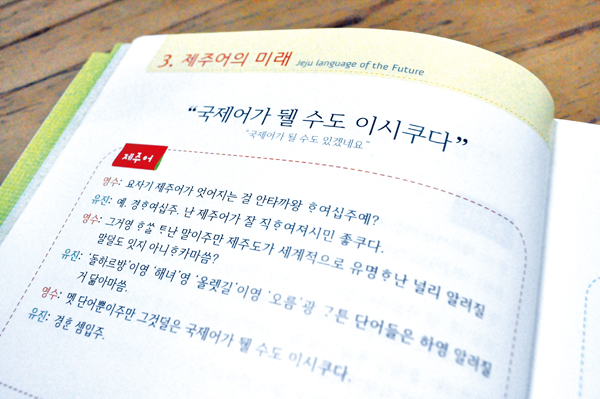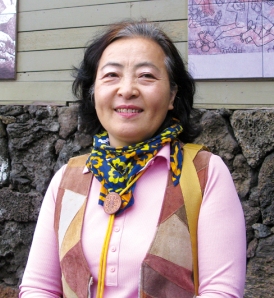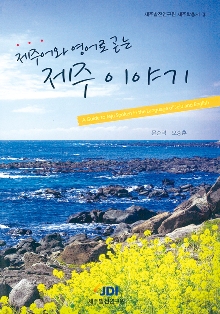| |
 |
|
| ▲ Adults must take pride in Jejueo says linguist Moon Soon-Deok. Photo by The Jeju Weekly |
Linguist Moon Soon-Deok believes the future of the Jeju dialect lies in the home of each and every Jeju family, and adults must take the lead in celebrating their linguistic heritage.
“Firstly, adults should be aware of the need to use Jeju dialect in the home in conversation so children can learn,” she said. “Only by using it can we transmit it [to our children]. That is the difficulty.”
As research fellow at Jeju Research Center within Jeju Development Institute (JDI), Jejueo's survival is one of her chief concerns, and her doctorate in local syntax, semantics and grammar make her a leading expert.
| |
 |
|
| ▲ Photo courtesy Mun Soon-deok |
JDI didn’t even undertake linguistic research before Moon's arrival, it having the broader remit of Jeju culture. From 2008, she pushed for more research and she has since published three books.
Among these is ‘Jeju Iyagi,' co-authored with Oh Seung-hun. The book introduces Jeju culture though simple Jejueo conversations alongside English and standard Korean translations.
“The program originally started as a series in a magazine and then I decided it would be beneficial as a book. As it was targeted to Koreans outside of Jeju, the conversations introduce interesting local topics,” she said.
In addition to visitors, she also hopes the book helps locals themselves become more accustomed to seeing the language written as well as spoken.
Along with households, she also urges schools to create Jeju dialect zones — “even if it is not in lesson time” — and for Jeju residents to use it "whenever they see someone on the streets."
Like all vernaculars, it has a local earthiness and affection that the centralized standard lacks, and Moon fears one day all that will be left are the Jeju legends, known only through an archaic tongue.
“The key to Jeju culture is the Jeju language ... but if we don’t use these words they will disappear. My main purpose is to bequeath our heritage, because if people no longer use it, that [the legends] are all that we will have left. That is all. Nothing else,” said Moon.
| |
 |
|
| ▲ Photo courtesy JDI |
Classification contention
Despite her clear passion for the ‘language,’ she opposes such a classification, reflecting an ongoing debate around whether it is a language ("Jejueo") or a dialect ("Jeju bangeon").
Moon herself prefers "Jejumal" which can mean language, dialect and speech.
Linguistically speaking it is, she says, a dialect of Korean and should be seen under the same umbrella as Gangwon and Gyeongsang dialects.
“That is to say, there is one mother, Korean, and [the other] dialects are siblings. In linguistics, a language should be a distant relative, not a sibling.”
This counters recent international research which considers Jejueo a sister language of Korean due to mutual unintelligibility.
Not so, says Moon, adding that while such findings appeal to the current zeitgeist for Jeju difference, she believes linguistically it is “a misconception” (even if it has utilitarian value in promoting language use).
“It is only unintelligible because we haven’t heard it before, not because it is a different language,” adding that Gangwon dialect is the same to outsiders.
Perhaps there are echoes of the 1970s one nation, one language policy which Moon cites for the decline in use since then. She was one of the children told not to use Jejumal in school.
While impelling families to champion the language within the home, Moon is thankful for the provincial support in culture, the arts and dialect competitions.
UNESCO recognized Jejueo as an endangerd language in 2011 and added it to its Atlas of the World's Languages in Danger, an essential catalyst for increased support. Education superintendent Lee Seokmun has also supported more Jejueo content in schools.
Although many have criticized the lack of concrete measures to protect Jejueo, in the context of Korea, Moon sees plenty to be positive about.
“Luckily Jeju Island strongly supports [Jejueo] through policy. Therefore, this province is unique nationally in that it is conserving the dialect. We were the first, and we are leading,” said Moon.
To download Jeju Iyagi in full in pdf form visit Jeju Studies at JDI visit jdi.re.kr.
|






















